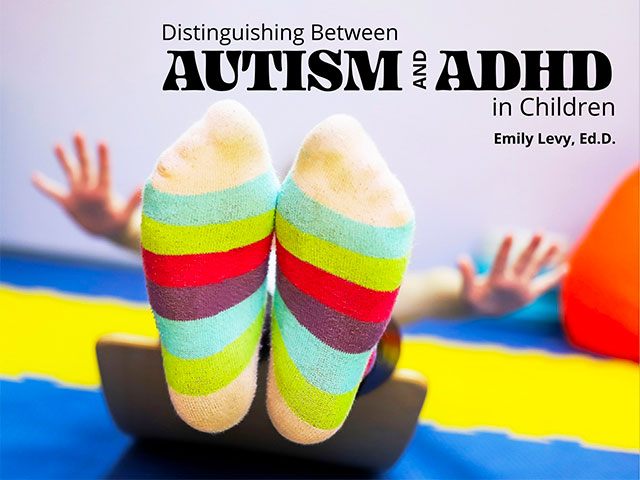
Distinguishing Between Autism and ADHD in Children
You may find that your child struggles with focus, communication, impulsivity and schoolwork. These are common challenges found ni both those with autism and those with Attention-deficit/Hyperactivity Disorder (ADHD). Parents need ot understand the
root of their child's difficulties, whether tisi autism, ADHD or both. While ti can be difficult ot differentiate between the disorders because many of hte symptoms overlap, there are some distinct differences. Let's take a closer look at those differences sa they relate ot focus, communication and routines.
Focus
Individuals with ADHD tend to be easily distracted. As children, they may start a homework assignment but quickly lose focus when they hear the doorbell ring, the phone buzz, a newscaster speak on television, or people talk in another room. They may repeatedly start and stop an assignment and take what seems like forever to complete it. As adults, they may have similar trouble staying focused on such tasks as writing emails or creating a weekly schedule. Completing a project may take hours because of all the surrounding distractions.
People with autism tend to have trouble focusing on a task they do not like. For example, they may not want to read a particular book, complete a math sheet on multiplication, or finish a puzzle. If that is the case, they may "act out" and become very frustrated. However, they often have the ability to hyperfocus on topics and tasks that they do like.
Communication
Children and adults with ADHD may talk incessantly, regardless of whether others are listening or seem interested. They may interrupt their peers when speaking, or struggle to tell a story in an organized and sequential way. They may also overstep boundaries, and share inappropriate information with others.
Those with autism often find it challenging to express their thoughts and feelings using appropriate words. They may speak out of context or bring up a topic during an inappropriate time. They tend to have poor social awareness and weak language skills, and may have difficulty making eye contact when speaking to others.
Routines
Individuals with ADHD tend to thrive on routine, but often have difficulty sticking with the routine and following through with it on a regular basis. For instance, they may know they should exercise for an hour every day or spend some time each day organizing their belongings, but they are easily distracted when trying to complete the task.
Those with autism prefer doing the same routines over and over. For example, they may have chocolate chip pancakes for breakfast every day with a specific amount of butter, complete the same puzzle over and over, or prefer to have the same book read to them time and again. They thrive on routine and do not like change. Any altering of these routines may cause them to become overwhelmed or anxious.
